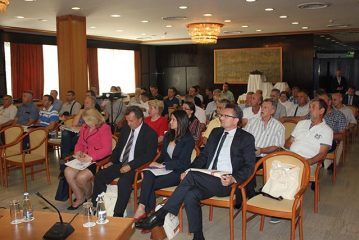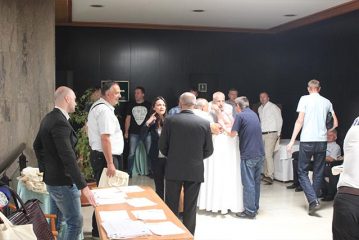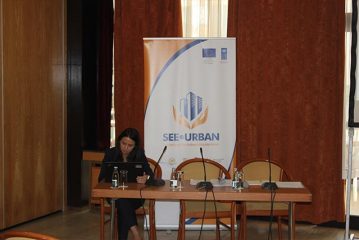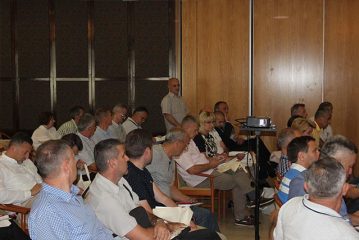Bosnia and HerzegovinaSEE Urban project initial promotion has been conducted on 17th of March in Bijeljina in organization of Association of Municipalities and Cities of Republika Srpska and Association of Municipalities and Cities of Federation of Bosnia and Herzegovina. Around 50 participants attended the event, namely representatives of local self-governments dealing with DRR as well as representatives of key state and entity stakeholders in DRR (Ministry of Security of Bosnia and Herzegovina, Civil Protection Administration of Federation of Bosnia and Herzegovina and Civil Protection Administration of Republika Srpska). During the event, SEE Urban Project Fact Sheets were distributed and questionnaires were filled-in by relevant representatives of local self-governments reflecting the positive feedback on the information received during the event.
UNDP Country Office representatives briefly presented former and current UNDP activities related to climate resilience and disaster risk reduction and introduced the SEE URBAN project. Close interlinkages between the DRR and climate change adaptation policy and measures have been pointed out.
More information on the SEE Urban project details have been provided by project coordinator, Mr. Krunoslav Katic, including the project partners, academic counterparts, the expected national and regional project events: round-tables and conferences, as well as the future DRR platform. He stressed the importance of urban and local networking and cross-border cooperation, in particular for accessing the international aid funding. Further on, in order to showcase what concrete experience and knowledge project can bring to the participating countries and their municipalities, Mr. Stjepan Behim presented the good practice of Croatian Counties / Cities Disaster Risk Reduction Platform, explaining its structure, organization and responsibilities. He underlined the importance of strengthening the DRR practice on the local level, but he draw attention to sometimes insufficient local capacities for e.g. disaster risks assessments or critical infrastructure determination. He highlighted the importance of territorial cooperation, spatial planning and construction standards, illustrating it by Slovenian examples of good practice. He initiated a valuable knowledge transfer and sharing of lessons learned that will also be supported under the SEE Urban project and its knowledge and information sharing platform.
Along with the SEE URBAN project presentation, during this meeting several national and local stakeholders presented their recent achievements in strategic, normative and financial spheres. Participants expressed strong interest in the SEE Urban project and its expected results.
After the official meeting, the Expert Group for SEE URBAN Project for Bosnia and Herzegovina held a working meeting where following was agreed:
- The best option for SEE URBAN model in Bosnia and Herzegovina is through existing associations that enable creation of network of experts
- Expert networks are already envisaged through strategic documents of relevant associations so no additional approvals are required
- Associations will start with creation of experts network through requests to municipalities to nominate experts. All appointments should be collected by mid-April
- Associations will start working on the Rules of Conduct for Network of Experts
- The established Expert Working Group of SEE URBAN in Bosnia and Herzegovina would be the backbone of work and the main advisory body for the establishment of these networks. Members of this group would travel to the countries of the region to present the BiH model







